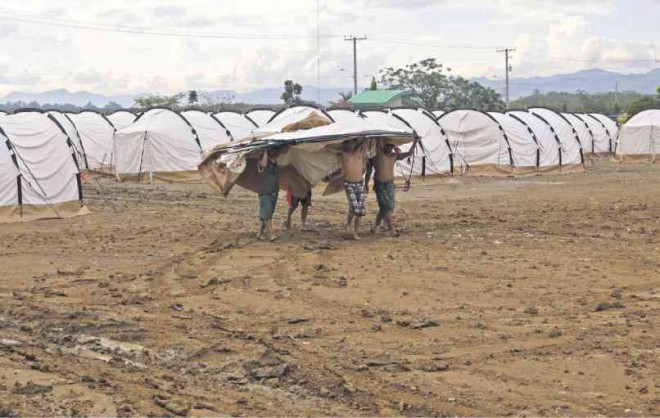
WORKERS carry one of the dwellings at the “tent city” occupied by Supertyphoon “Yolanda” evacuees at South Road Properties in Cebu City. Photo by:LITO TECSON/CEBU DAILY NEWS
CEBU CITY, Philippines—Emerita Antonino has no plans yet of returning to her hometown in Palo town, Leyte province.
“I’d rather stay in Cebu so that we will forget the nightmare that we experienced during the typhoon and move on,” the 46-year-old woman said.
A storm surge brought about by Supertyphoon “Yolanda” claimed the lives of her husband, Ernesto, and two daughters—Erica Cressia, 18, and Ma. Celeste, 14—and destroyed their house in Palo on Nov. 8, 2013.
Emerita and her three other children—Ernest, 19, Eloisa Catherine, 17, and Maria Emelyn, 14—took the offer of a free ride by a shipping company and arrived in Cebu City on Nov. 21.
They are now staying in a “tent city” at South Road Properties (SRP) along with 54 other families who evacuated from Guiuan town and Borongan City in Eastern Samar province, Basey town in Samar province, and Tacloban City and the towns of Pastrana, Palo, Alang Alang, San Isidro, Villaba, Dagami and La Paz in Leyte.
Family rebuilding
Formally called the Family Rebuilding Center, the tent city is being run by the Philippine Red Cross (PRC) and the city government until March 23. Based on a PRC agreement with the city, the facility will operate for only three months.
“What we are doing now is to teach the typhoon survivors to stand on their own. We cannot teach them to have that kind of a mind-set if we keep on extending their stay at SRP,” said Vic Jay Gonzal, who is in charge of the place.
Ester Concha, head of the city’s department of social welfare and services, said 10 of the 54 families staying in the tent city wanted to go back to their hometowns while 31 families chose to stay. The rest have not made yet up their minds, she said.
Those who are staying are given the opportunity to take short courses on household servicing, plumbing and machining among others at the Technical Education and Skills Development Authority (Tesda) in Barangay (village) Lahug.
Skills training
For them to work immediately, Marc Canton, convenor of the nongovernment organization Movement for Livable Cebu (MLC), has asked the Tesda to shorten the study period from the usual six months to a month.
Canton said MLC would provide P100 to each Tesda scholar to cover their daily transportation, from City Hall to the Tesda office, and one meal. The city shuttle can only ferry them from the tent city to City Hall.
Even before the skills training was offered, many typhoon survivors have been able to find work in hotels, calls centers and malls in Cebu, Concha said.
One of them is Emerita’s son, Ernest, who was hired as a computer encoder in Barangay Apas last month.
Emerita, a dressmaker, said she would avail herself of the Tesda training, hoping to find a job so she could send her daughters, Eloisa Catherine and Maria Emelyn, to school again this June. Eloisa is a first year college student while Emelyn is a high school junior.
Housing plans
“We have decided to just stay here in Cebu because there is nothing left to return home to but horrible memories of Yolanda,” Emerita said. “Each time I remember, I just close my eyes and pray. I have to be strong because I still have my three children with me.”
Jocelyn Diaz, 50, of Tacloban, said she and Emerita had agreed to look for a house in Cebu City and share the rent once they leave the tent city. One of Diaz’s two children has been employed as a production worker at Mactan Export Processing Zone since Feb. 17.
“We are very thankful to the city government and its partners for taking care of us even if they do not know us. The Red Cross has been watching over our stay in Cebu 24/7,” Diaz said.
According to Concha, the city government is not allowed to release money to the survivors as down payment for house rentals. But she said it would seek the help of the National Housing Authority and the Department of Social Welfare and Development in finding houses for them.
No choice left
Samuel Baquilod said he and his wife had decided to go back to Tacloban to check on their relatives.
“We have no other choice but to go home when the tent city closes on March 23. We do not have relatives in Cebu and we do not know what will become of us if we stay here longer,” he said.
Concha said the city government could send 10 families back to their hometowns under its Balik Probinsya program. They will receive P3,000 each to cover their boat and bus fares, as well as meals.
The program, which has a P1.5-million fund, aims to help indigent transients go back home so that they will not end up as street dwellers or mendicants. Lately, it has also covered typhoon survivors.
The city government is negotiating with the Air Force and the Navy for the use of C-130 planes or Navy ships.
“Flying on the C-130 planes will be the best option for the Yolanda victims because they will have more than enough space to also bring with them items they had saved during the typhoon and had acquired during their stay here,” Concha said.